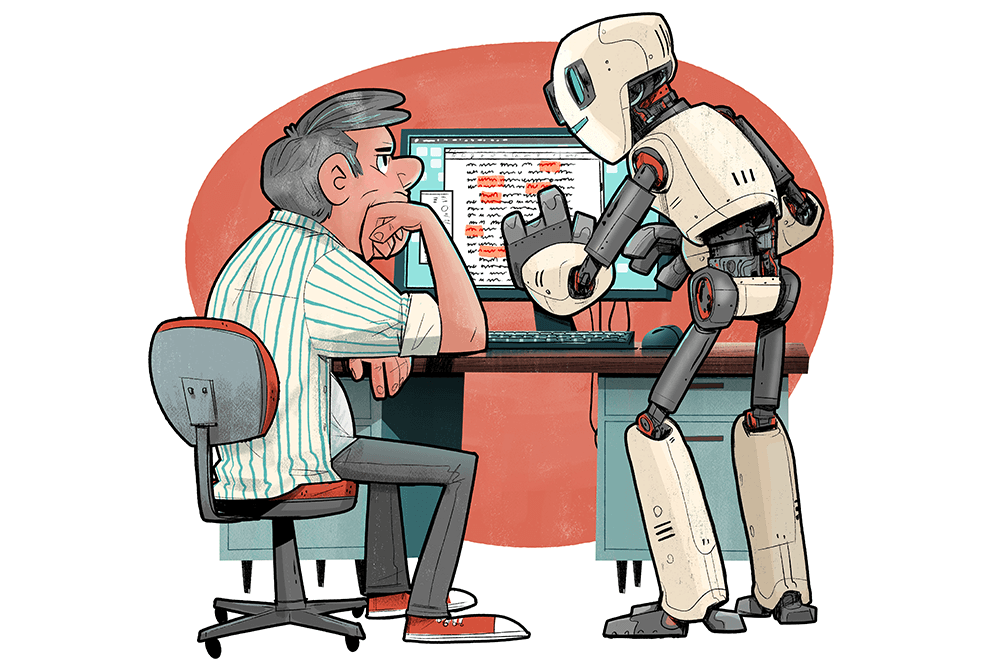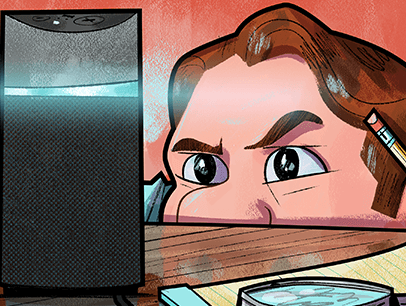
This column might well sound my literary death knell. In telling you about the many artificial intelligence (AI) apps that do your editing—and even your writing—for you (more on this to come), I am telling my editors why they no longer need me—not when they can download, say, Grammarly, Jasper, or Wordtune for 4.99, enter a few key words relevant to a particular subject, click “Generate,” and get a perfectly publishable column in minutes. Needless to say, I make more than 4.99 per column. Not a lot more, but times are tough, or so my editors tell me.
My only hope of not being replaced by an algorithm is that this is a humor column. All of these programs claim to write spiffy copy for advertising, marketing, emails, websites, blogs, and other work-world communications. None of them are funny. They try to be, by mimicking a real comic author’s style that they’ve copied off the web. But it’s like Alexa telling you a mother-in-law joke. It’s only funny when you have a real mother-in-law.
As someone who came up the hard way—doing my own thinking and writing—I find this whole business more than a little unsettling. Are people really willing to surrender their unique voices, thoughts, and insights to an unknown programming whiz in Silicon Valley? Do they really believe a manufactured facsimile is superior to their own majestic cerebrum?
Boy, do they ever.
The testimonials for these apps sound like their users have found the Fountain of Youth. Someone named Mark wrote, “I’ve been a journalist for 30 years and Wordtune often suggests sentences that are better than mine.” Gee, Mark, nothing like advertising why you should be fired. George, another Wordtune enthusiast, gushes, “My writing has improved tremendously!” An admirable accomplishment indeed, and even more so if George actually had something to do with it.
Does this sound like sour grapes? Am I whining because I think these people are cheating? Is my own writing so great that it couldn’t use a little cyber help? Worst of all, am I suggesting that Toastmasters shouldn’t use these programs to improve their own communication skills?
I refuse to answer on the grounds that it may incriminate me.
I’m not saying these tools are completely devoid of value. An app called Hemingway, for instance, will take what you’ve written and highlight everything that’s wrong with it, thereby improving your prose and shattering your ego. Sentences highlighted in yellow are too long and complex; those shadowed in red are deemed dense, meandering, and hard to follow. Your task is to make them shorter and simpler, much like Ernest Hemingway’s own style. Which is not to say that people will start comparing you to the real thing. I think we can all agree that if you could write like Hemingway, you wouldn’t need Hemingway.
Simplified is another AI app geared toward marketing communications, promising to produce exciting advertising copy in minutes. As a former copywriter, I know that while the writing may be artificial, the client isn’t. What happens when they hate it? Perhaps Simplified will write a nice resignation letter for you.
And then there’s Peppertype, which you can “train” to adapt to your own style. Question: If your own style is the problem, why would you adapt the program to produce more of it? Peppertype will do it because its intelligence is artificial. If it were really intelligent it would ask, “With all due respect, do you have a wastepaper basket?”
All of these programs offer the one benefit that they assume you will find more valuable than a free year of Amazon Prime: NO MORE WRITER’S BLOCK! Not being human, AI doesn’t understand that many writers welcome writer’s block. It gives them an excuse to escape the agony of a blank white page and go do something they actually enjoy.
(ALERT! This is John Cadley. The column you have just read is NOT mine. It was written by a new AI app called WriteyTighty, which they asked me to beta test and then published the results without my permission. I’m sure you’ve noticed it’s not nearly as funny as my own columns—none of the biting wit, searing satire, and side-splitting humor that prompt so many to compare me with Aristophanes and Mark Twain. Please write and tell the editors you agree with me that this is not funny. Please.)
John Cadley is a former advertising copywriter, freelance writer, and musician living in Fayetteville, New York. Learn more at www.cadleys.com.







